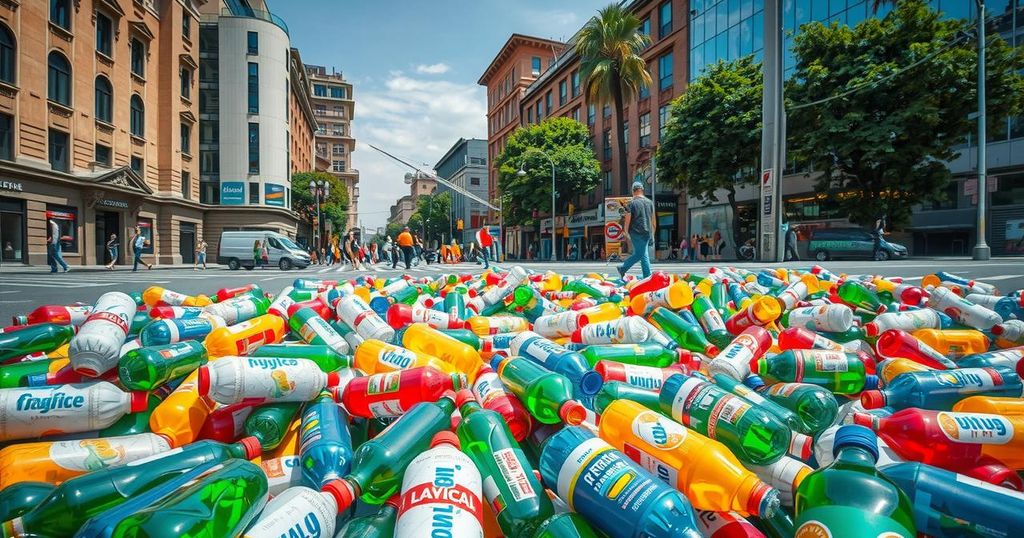Colombian Waste Pickers Inundate Iconic Bogota Square With Plastic Bottles To Protest Falling Wages

Dozens of Colombian waste pickers gathered at Bogota’s Bolivar Square, bringing 15 tons of recyclable goods to protest falling wages and decreasing conditions. They seek fair compensation from factories, emphasizing their essential role in the recycling chain. The drop in plastic prices has made it increasingly difficult for waste pickers, who already earn less than the national minimum wage, to sustain their work amidst rising competition.
In a bold display of solidarity, dozens of Colombian waste pickers flooded Bogota’s historic Bolivar Square on Tuesday. They brought approximately 15 tons of recyclable materials to protest against sinking incomes and the harsh realities they face in their daily work. As they collected trash from various sources, including homes and factories, they aimed to shed light on their vital yet often overlooked role in recycling.
Organized by 14 different associations, the demonstration drew around 100 participants, who humorously pretended to swim amid the towering heaps of plastic bottles and cardboard. Nohra Padilla, president of Colombia’s National Association of Waste Pickers, passionately stated, “We want factories to pay us a fair price for the materials we collect.” She reminded onlookers that without the efforts of waste pickers, landfills would quickly become overwhelmed.
Typically, waste pickers work independently, navigating through the streets with heavy carts, scavenging materials that municipal garbage trucks often overlook. These trucks tend to concentrate on non-recyclables, leaving a significant amount of recyclable waste in the hands of individuals earning meager wages. Each waste picker’s pay varies significantly as it relies heavily on daily recyclable collections.
Jorge Ospina, who leads the ARAUS waste pickers association, expressed concerns over plunging prices for recyclables. Over the past two months, the rate for plastic dropped from 75 cents to just 50 cents per kilogram, forcing him to reduce pay to 25 cents per kilogram for the workers. This steep decline has caused frustration, with Ospina attributing the drops to the influx of imported plastics from countries like China.
“More government regulation is necessary,” he warned, anticipating that if these prices keep falling, waste pickers may lose the incentive to continue their work, leading to even more significant landfill issues across Colombia. Notably, Colombia’s constitution extends protections to waste pickers, categorizing them differently from larger waste management contractors.
In urban areas, municipal governments are mandated to compensate waste picker associations based on collected trash volumes, signaling a crucial recognition of their labor. However, the instability in recyclable prices provides a challenging environment. Moreover, the competition is intensifying as Venezuelan migrants increasingly join the ranks of waste pickers in cities like Bogota and Medellin.
Sadly, many waste pickers earn below the national minimum wage of $350 monthly, underscoring the financial struggles that these essential workers face in their efforts to contribute to environmental sustainability. This protest is just one of many steps they are taking to call for better treatment and fair wages in a field laden with adversity.
The demonstration at Bolivar Square by Colombian waste pickers highlighted critical issues such as dwindling incomes and competition from migrants. Leading figures voiced the urgent need for fair compensation for their work, which significantly impacts recycling efforts. As prices for recyclables continue to fall, the sustainability of their livelihoods hangs in the balance, prompting calls for government intervention and support for this marginalized community.
Original Source: www.newsday.com








